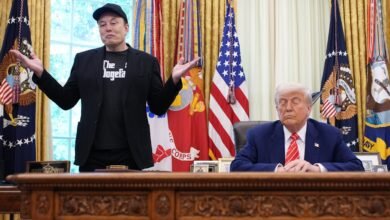Meet the New Autocrats Who Dismantle Democracies from Within

September 23, 2024
5 min read
Meet the New Autocrats Who Dismantle Democracies from Within
The new interconnected breed of autocrats gains and retains power by deception, globally undermining democracies through their own institutions

Viktor Orban, Hungary’s prime minister, spoke during the 2022 Conservative Political Action Conference (CPAC) in Dallas, Texas.
Dylan Hollingsworth/Bloomberg via Getty Images
An autocratic wave has crept up on us in the U.S. and over the world in the last decade. Democracy and autocracy were once seen as two separate and distant worlds with little in common, and that the triumph of one weakened the other. Now, however, autocrats across the globe, in poor and wealthy nations, in established and nascent democracies, and from the right and left, are using the same tactics to dismantle democracies from within.
As of 2021, of the 104 countries classified as democracies worldwide, 37 had experienced moderate to severe deterioration in key elements of democracy, such as open and free elections, fundamental rights and liberties, civic engagement, the rule of law, and checks-and-balances between government branches. This democratic backsliding wave has accelerated since 2016 and infiltrated all corners of the world.
With the upcoming U.S. presidential election in November, questions about the future of American democracy take on urgency. As the American public seems increasingly receptive to autocratic tactics, these questions become even more pressing. Will the U.S. slide into autocracy, faced with a presidential candidate in Donald Trump who promises to be a dictator on his first day in office? Can lessons from autocracies elsewhere help us detect democratic backsliding in the U.S.?
On supporting science journalism
If you’re enjoying this article, consider supporting our award-winning journalism by subscribing. By purchasing a subscription you are helping to ensure the future of impactful stories about the discoveries and ideas shaping our world today.
To answer these questions, we first need to identify how the new breed of autocrats attains and retains power: their hallmark strategy is deception. How does a roll call of modern autocrats, and wannabe autocrats, like Hungary’s Viktor Orbán, Russia’s Vladimir Putin, El Salvador’s Nayib Bukele, India’s Narendra Modi, Turkey’s Recep Tayyip Erdoğan, and Venezuela’s Nicolás Maduro implement this modus operandi for the latest model of autocracy? They twist information and create confusion within a façade of democracy as they seize power. They do not overthrow democracy through military coups d’état but by undoing core democratic principles, weakening the rule of law, and eliminating checks and balances between branches of government.
Rather than eradicating democratic institutions as leaders like Chile’s Augusto Pinochet or Zaire’s Mobutu Sese Seko did in the past, today’s established and emergent autocrats (as is the case of Maduro or Orbán, for instance) corrupt the courts, sabotage elections and distort information to attain and remain in power. They are elected through ostensibly free elections and connect with a public already primed to be fearful of a fabricated enemy. Critically, they use these democratic tools to attain power; once there, they dismantle those processes. Autocratic tactics creep into the political life of a country slowly and embed themselves deeply in the democratic apparatus they corrupt. Modern autocracy, one may say, is a tyranny of gaslighting.
We gathered a group of scholars who have looked at successful and failed autocracies worldwide in a special issue of the American Behavioral Scientist, to identify common denominators of autocratic rulers worldwide. This research shows that modern autocrats uniformly apply key building blocks to cement their illiberal agenda and undermine democracies before taking them over. Those include manipulating the legal system, rewriting electoral laws and constitutions, and dividing the population into “us” versus “them” blocs. Autocrats routinely present themselves as the only presumed savior of the country while silencing, criminalizing and disparaging critics or any oppositional voice. They distort information and fabricate “facts” through the media, claim fraud if they lose an election, persuade the population that they can “cleanse” the country of crime and, finally, empower a repressive nationalistic diaspora and fund satellite political movements and hate groups that amplify the autocrats’ illiberal agenda to distort democracy.
In February, Bukele, the popular Salvadoran autocrat and self-described “world’s coolest dictator,” spoke at the 2024 Conservative Political Action Conference (CPAC), an annual convention for U.S. right-wing elected officials and activists. There he received a standing ovation after he flaunted his crackdown on crime in his country and suggested the U.S. should follow his tactics. His speech demonstrates how, regardless of political history and ideology, or their nation’s wealth and place on the global stage, autocrats today deploy a similar “toolbox of tricks” aimed at legalizing their rule. That’s because they copy from one another and learn from one another’s successes and failures. Vast interconnected networks enable autocrats to cooperate, share strategies and know-how, and visit one another in public shows of friendship and solidarity to create an international united front. Just ask Orbán, the Hungarian prime minister and autocrat, who received a warm reception when he spoke at the CPAC in 2022, reminding the crowd of the reason for his visit: “I’m here to tell you that we should unite our forces.”
Global networks of autocratic regimes also provide economic resources to other autocrats and invest in their economies, share security services to squash popular dissent, and sometimes interfere in each other’s elections.
Modern autocrats do not act alone; their connections with one another are complemented and sustained by a varied cadre of legal specialists, political strategists and academics who tend to be economically secure, well-educated and cosmopolitan. These individuals, like Michael Anton and those tied to the Trump-defending Claremont Institute, the over 400 scholars and policy experts who collaborated on Project 2025— the extreme-right game plan for a Trump presidency—and Stephen K. Bannon, who called for the “deconstruction of the administrative state” by filling government jobs with partisans and loyalists, move in and out of government positions and the limelight. They are nimble and, moreover, fundamental to the autocrats’ strategies, as they create videos and podcasts and write books to fabricate good images of the autocrats, write detailed blueprints for an autocratic form of government, and consult aspiring autocrats on best practices.
Evidence indicates that we are in a critical moment in U.S. democracy. Will the U.S. inevitably descend into autocracy? No, not with an alert and well-informed electorate. Recognizing the strategies that autocrats use and share, veiled behind a façade of democratic elections and wrapped in fearmongering, equips us to understand the harmful consequences of these strategies for democracy, and perhaps to stop the wave in time.
Juan Sebastián Chamorro, a Nicaraguan opposition politician and prospective presidential candidate, was accused of treason, arrested and banished simply for running as an opposition candidate by the regime of President Daniel Ortega and Vice President Rosario Murillo (who is also first lady). In exile, Chamorro has described a danger countries face: autocrats who come to power through democratic systems are “like a silent disease—the early symptoms of this silent disease are usually dismissed, but once it begins to consume the body, it is usually too late to stop it.”
This is an opinion and analysis article, and the views expressed by the author or authors are not necessarily those of Scientific American.





